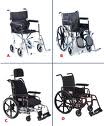Asia
Contents
- 1 U.N. Conference in Sendai Adopts Action Framework on Disaster Risk Reduction incorporating Disability-inclusive Perspectives
- 2 Call to hire special needs people in workforce
- 3 PPAF imparts training to 600 handicapped annually
- 4 Assistive Technology Center in Qatar
- 5 WHO vaccinates 1.2 million Children in Afghanistan
- 6 Digital files giving new hope for disabled students
- 7 Holy Quran is now available in Braille
U.N. Conference in Sendai Adopts Action Framework on Disaster Risk Reduction incorporating Disability-inclusive Perspectives
The third U.N. World Conference on Disaster Risk Reduction was held from March 14 to 18, 2015, in Sendai, Miyagi Prefecture. One of its working sessions focused on "disability-inclusive disaster risk reduction" for the first time. The Post-Hyogo Framework for Action adopted at the Sendai conference incorporated the need for disaster management measures inclusive of persons with disabilities and expected to be reflected in future disaster management measures of member states and an important milestone for disability inclusion in international development frameworks such as the U.N. Sustainable Development Goals (SDGs) to be adopted next fall.
The first meeting of the World Conference on Disaster Risk Reduction held in Yokohama in 1994 issued the "Yokohama Strategy and Plan of Action for a Safer World" and the second conference held in Kobe, Hyogo Prefecture, in 2005, adopted the "Hyogo Framework for Action 2005-2015." In the Sendai conference, about 350 side events were held in addition to working sessions and about 10,000 persons attended it. It adopted the "Sendai Framework for Disaster Risk Reduction 2015-2030," following the Hyogo framework.
The importance of disability-inclusive disaster management has been gaining recognition around the world. It is against this backdrop that the UN World Conference on DRR took this up as one of the themes of its working session for the first time. With a new framework for action allowing all persons with disabilities to participate adopted, not only will human suffering in disasters be reduced but it will open up new opportunities for disability inclusive post-disaster recovery.
Source:http://www.nippon-foundation.or.jp/en/news/articles/2015/3.html
Call to hire special needs people in workforce
Employers interested in recruiting can contact Community Development Authority for assistance By Dina Aboul Hosn, Staff ReporterPublished: 00:00 October 25, 2010Reader comments (1) Dubai: The Community Development Authority (CDA) yesterday held a meeting on the rights of people with disabilities to get suitable employment with human resources managers representing government and private sector institutions. The meeting focused on CDA's efforts and its partners to integrate, enable and facilitate the involvement of people with special needs in the workforce and its Elkayt programme, which provides vocational guidance and follow up as community education as well as advisory services for institutions willing to provide appropriate jobs for people with disabilities. Several companies shared their experience of hiring people with disabilities at the session, which also addressed the challenges faced by disabilities in the workplace and steps to improve their situation in society. Amnah Al Obaidli, Manager Community Care, said employers interested in hiring people with disabilities can contact CDA, which will arrange a meeting with the employer to explain the service and can arrange an awareness session for human resources employees to explain the advantages of hiring people with disabilities. The employer can see the profiles of available candidates at CDA and work with the authority to create a suitable job profile for one of the candidates suggested by the authority. "Alternatively, the employer can send their job requirements straight to CDA, who will nominate appropriate candidates, and some modification of job description may be required," Amnah told Gulf News. According to Amnah the hardest candidates to employ are mentally challenged people, because they often lack the basic skills such as reading and computer knowledge, but they can still be hired to do manual jobs and simple tasks. Equal opportunities The UAE Federal Law 29 of 2006 concerning the rights of individuals with special needs (2006) addressed the issue of discrimination against people with special needs and promoted equal opportunities in health care, employment, sport and education. "Although labour law applies to all workers including those with disabilities, sometimes we try to meet their individual needs such as the need for more breaks or shorter hours, or the need to take time off to see a doctor, for example," Amnah said. "Although people with disabilities generally get paid less, we try to secure them salaries equivalent to or above the amount paid in [government] social support," she said. CDA's mission does not end with the employment of one of its candidates, but extends to offering support for the individual and their employer which may include intervention to change job requirements or even providing an alternative job, if necessary. "We also offer counselling for the employer, employee and colleagues who may find difficulties in dealing with a person with disability, especially with cases such as autism or Down's syndrome," she said. "We believe that anyone with disability can be integrated and has something to give, even with limited abilities," she said. Any Emirati man or woman with disability can benefit from CDA's services, which cover Dubai but can help Emiratis from other emirates wishing to find employment in Dubai, she added.
Source: Gulf News
PPAF imparts training to 600 handicapped annually
ISLAMABAD: Pakistan Poverty Alleviation Fund (PPAF) has launched a nationwide Enterprise Development Training programme for persons with disabilities (PwDs) more than 600 annually, to impart them business development and skills trainings.
This unique initiative being undertaken for the benefit of disabled persons is first of its kind in Pakistan.
Launched under PPAF’s Disability Programme, the purpose of this programme is to impart useful skills trainings to PwDs so that they could become independent breadwinners for their families.
PPAF help persons to develop their own business plans under its Business Incubation Segment and finance them to establish businesses of their own choice immediately after undergoing this training programme.
The network of partner organisations spread across 127 districts of the country. PPAF has also launched a phased carpet survey to identify persons with disabilities and their inclination towards certain businesses.
As a pilot project, PPAF has imparted training to a batch of 42 persons with disabilities, which also included 14 disabled women, in Multan.
Source: Daily Times
Assistive Technology Center in Qatar
People living with disabilities in Qatar now have access to a valuable new Center for Assistive Technology, Mada, which opened to the public on June 1, 2010.
Mada is an innovative center that strives to connect people with disabilities to the information and communications technologies (ICT) that can empower them to excel in all aspects of their life.
For someone living with a disability, integrating into a work place, or learning in a classroom is often a challenge. But with the of use Assistive Technologies, many of these challenges can be overcome, and people with disabilities can become full participants in all facets of society. We invite all people with disabilities and their families to visit our center and discover the variety of Assistive Technologies available,"said David Banes, Deputy Director, at the official launch of Mada.
Mada, a non-profit organization, includes an interactive resource center that showcases the latest Assistive Technologies (AT) and offers personal consultations for people with disabilities to identify the AT solutions that can best fit their needs, as well as training on how to use the various technologies. Mada, which also features an accessible library, is designed to be a barrier free space for people with a wide range of disabilities.
Some of the technologies exhibited at Mada include eye gaze control systems, which allow individuals to control a computer and communicate with only the movement of their eyes; accessible mobile phones adapted for a range of disabilities; a wide variety of screen readers; and augmented and alternative communication technologies, which help replace written and spoken communication.
ictQATAR's Secretary General, Dr. Hessa Al-Jaber, who played an integral role in establishing Mada and serves as the Chair of its Board of Directors said, "The opening of Mada is an important milestone for helping Qatar be truly equitable and accessible for all. Mada is the result of tireless efforts by its talented team and the support of its many public and private partners here in Qatar. I am truly inspired by the work Mada is doing to bring the benefits of technology to those with disabilities and look forward to watching the center evolve and act as a model of excellence for the entire region."
Al-Jaber is joined on the Board of Directors by H.H. Sheikha Hessa bint Khalifa Al Thani, former United Nations Special Rapporteur on Disability; Hassan Ali Bin Ali, Chairman, Shaffalah Center; Ali Shareef Al Emadi, Group CEO, Qatar National Bank; Dr. Nasser Marafih, CEO, Qtel; Grahame Maher, CEO, Vodafone Qatar; and Mohammed Hammoudi, Country Manager, Microsoft.
Mada is working closely with numerous organizations supporting people with disabilities in Qatar in both the public and private sectors. These organizations have been a valuable resource in the development of the center, and will play a major role in identifying cutting-edge Assistive Technologies and referring people to Mada.
Mada is located on the seventh floor of Al Nasr Tower and is open from Sunday to Thursday, throughout the day.
Source: http://www.ameinfo.com
WHO vaccinates 1.2 million Children in Afghanistan
The United Nations World Health Organization (WHO) has vaccinated more than 1.2m children in Afghanistan against polio after a recent outbreak in neighbouring Tajikistan, the UN announced June 7.
As of June 5, some 200 cases of polio had been reported near the Tajikistan-Afghanistan border. More than 1m children were vaccinated by WHO in Tajikistan last month. Polio can spread rapidly and cause paralysis and death.
To make sure all children in the region were vaccinated, WHO set up immunization posts at border crossings to vaccinate children travelling between the two countries; carried out house-to-house visits; set up mobile clinics; and had vaccination teams in hospitals.
Afghanistan’s Badakhshan Province has been polio-free for ten years, making it more important to contain possible spill-over effects from outbreaks in neighbouring areas. Source: http://centralasiaonline.com
Digital files giving new hope for disabled students
Though he had sat in the classroom, the blind freshman felt as if he did not belong in the class. When professors and his classmates watched books, solved problems, and held discussions, he struggled to listen but could not remember everything.
Shortly after the first semester began, his pleasure of being a college student was overshadowed by worries over campus life. Before graduating from high school, he had faced little difficulty because he had textbooks in Braille. He knew that many blind college students failed to complete their studies due to lack of study materials in Braille.
In September last year, however, the amendment of the Library Act has provided him with digital files since mid-March this year. According to the amendment, the National Library Support Center for the Disabled under the National Library of Korea can ask publishers to provide digital files of books for the blind.
In the past, volunteers used to write books in Braille by hand or record audio books. The library, however, can now produce Braille or audio books in a few hours with the help of tools that translate digital files into voice or Braille.
The library announced the formats of the digital files in January. After receiving applications from disabled college students, it asked 59 publishers to provide digital files for 155 books. Since the announcement, 58 digital files have been presented. Kim is the first beneficiary of the amendment to the Library Act.
After SNU Press presented the digital file of “General Korean Language,” Kim could participate in a general Korean language class with his non-disabled classmates from mid March. He can also read the book with the help of the Braille terminal, an electro-mechanical device for displaying Braille characters.
“Thanks to the digital file, I can do my homework and prepare for the next class. I’m really lucky,” he said.
He does not have, however, all the necessary digital files for his classes. Taking six classes in his first semester, he needs reading materials in five out of the six, but has full access to digital files in just one class. He is partly supported by digital files in three classes but has no digital files in one class.
Despite the revision of the Library Act, not all publishers have proactively participated in creating digital files. Many hesitate to do so due to fears that the originals might be copied and circulated in the market.
Seven out of 59 publishers have declined the request of the National Library of Korea to present digital files. Library official Lee Yeong-suk said, “The revised Library Act was implemented just a few months ago so a perception gap exists among publishers.”
The number of blind and severely disabled people who cannot read books in Korea is an estimated 350,000. Out of 50,000 books published every year, however, just 2,000 are presented in Braille or audio book form.
In addition, more than three months are needed to produce books for the disabled since volunteers have to type words or record their voices. Worse, most of the books are no more than study materials for middle and high school students.
Source: http://english.donga.com
Holy Quran is now available in Braille
The full text of the Holy Quran is now available in Braille at the Government College University (GCU) for visually-impaired students from the GCU Centre for Special Students (CSS).
A copy of the Holy Quran in Braille was donated to the university library by Iqra Educational Trust’s United Kingdom Chairman Anees Qari. Speaking on the occasion, GCU Chief Librarian Abdul Waheed said, “The donated copy of the Quran is divided into twelve parts and has been placed in the Centre for Special Students (CSS). It was published in Saudi Arabia and the Braille paper is acid-free.”GCU Vice Chancellor Professor Khalid Aftab has issued special directions to provide all kinds of facilities to the university’s special students, the chief librarian maintained.
Waheed said the university has already digitalised the curriculum and reading books for visually impaired students besides printing them in Braille. The GCU CSS has high-tech computers which are capable of running heavy screen-reading software. “The centre surprises its visitors when they see blind students sending and receiving emails, chatting and browsing without any help,” he added. Visually-impaired students at the university expressed their pleasure at the availability of the Holy Quran in Braille at the CSS. staff report
Source: http://www.dailytimes.com.pk




